动词
图片预览


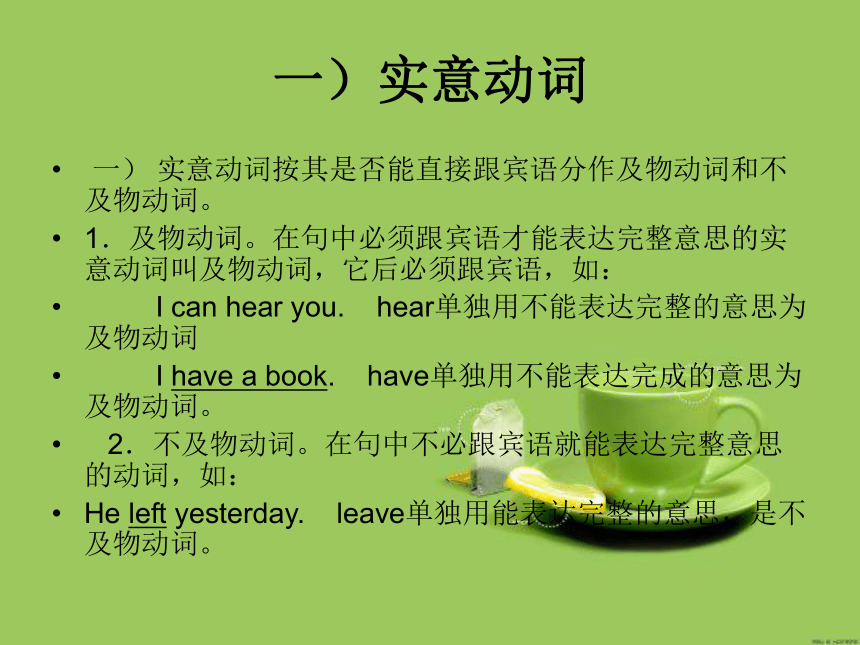

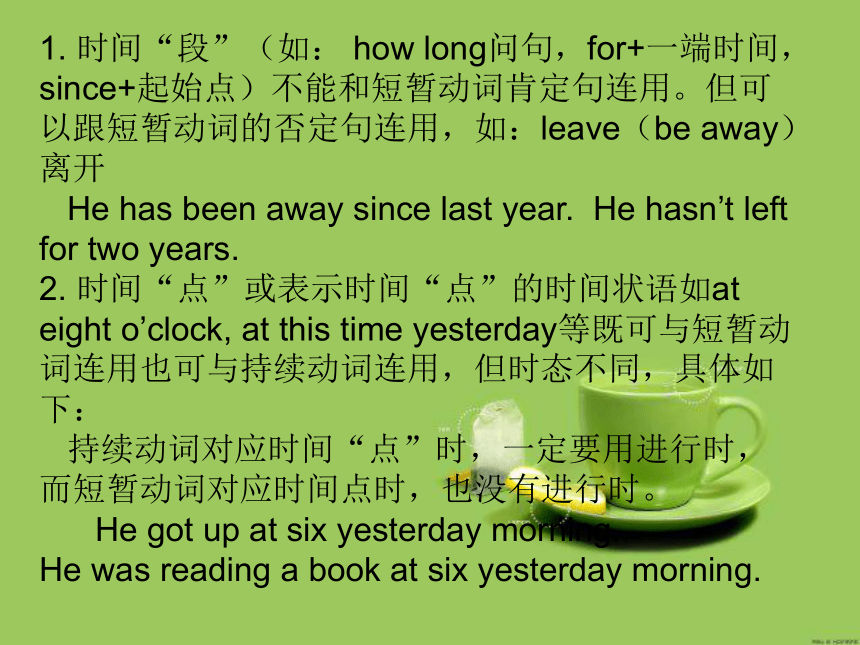
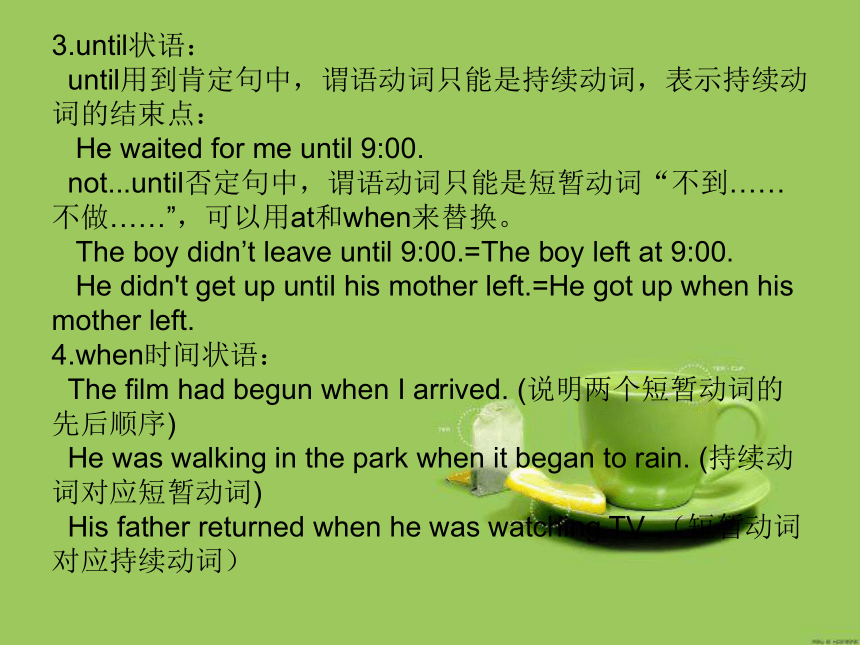
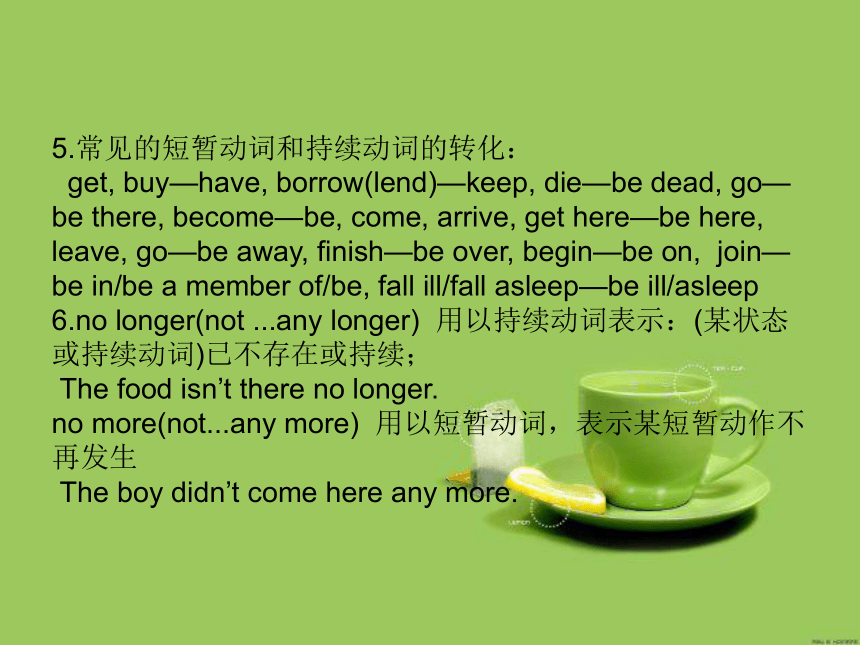
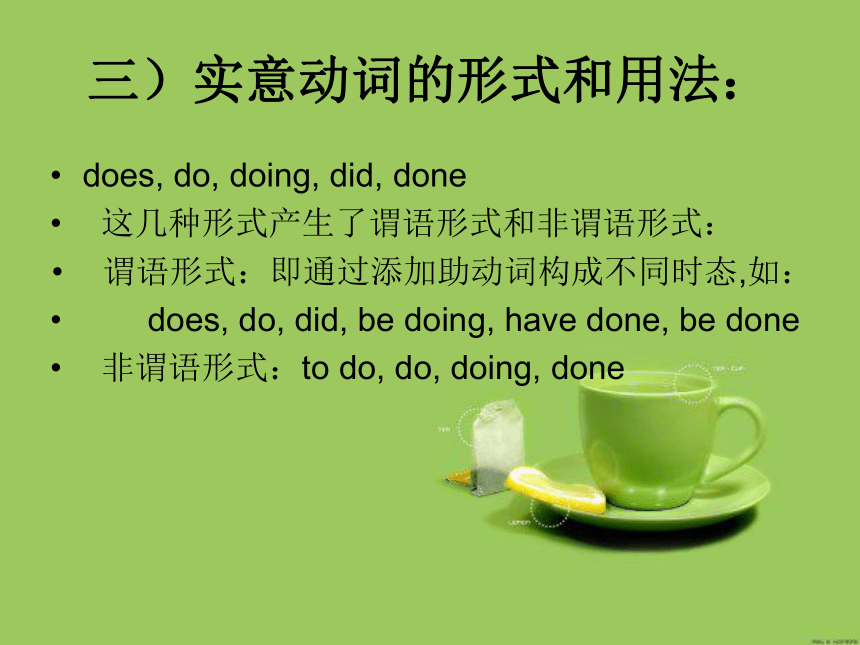




文档简介
(共72张PPT)
初中英语动词讲解
动词的分类
一、动词的分类、基本形式和用法
英语的动词按作用分为实意动词、连系动词、助动词和情态动词。
一)实意动词
一) 实意动词按其是否能直接跟宾语分作及物动词和不及物动词。
1.及物动词。在句中必须跟宾语才能表达完整意思的实意动词叫及物动词,它后必须跟宾语,如:
I can hear you. hear单独用不能表达完整的意思为及物动词
I have a book. have单独用不能表达完成的意思为及物动词。
2.不及物动词。在句中不必跟宾语就能表达完整意思的动词,如:
He left yesterday. leave单独用能表达完整的意思,是不及物动词。
二)短暂动词和持续动词
持续动词是指能和表示一段的时间状语连用的动词;短暂动词是指动作状态发生变化或位置发生转移的动词,在肯定句中,不能和表示一段时间的状语连用。
二者的区别主要体现在时间状语上,具体区别如下:
1. 时间“段”(如: how long问句,for+一端时间,since+起始点)不能和短暂动词肯定句连用。但可以跟短暂动词的否定句连用,如:leave(be away) 离开
He has been away since last year. He hasn’t left for two years.
2. 时间“点”或表示时间“点”的时间状语如at eight o’clock, at this time yesterday等既可与短暂动词连用也可与持续动词连用,但时态不同,具体如下:
持续动词对应时间“点”时,一定要用进行时,而短暂动词对应时间点时,也没有进行时。
He got up at six yesterday morning.
He was reading a book at six yesterday morning.
3.until状语:
until用到肯定句中,谓语动词只能是持续动词,表示持续动词的结束点:
He waited for me until 9:00.
not...until否定句中,谓语动词只能是短暂动词“不到……不做……”,可以用at和when来替换。
The boy didn’t leave until 9:00.=The boy left at 9:00.
He didn't get up until his mother left.=He got up when his mother left.
4.when时间状语:
The film had begun when I arrived. (说明两个短暂动词的先后顺序)
He was walking in the park when it began to rain. (持续动词对应短暂动词)
His father returned when he was watching TV. (短暂动词对应持续动词)
5.常见的短暂动词和持续动词的转化:
get, buy—have, borrow(lend)—keep, die—be dead, go—be there, become—be, come, arrive, get here—be here, leave, go—be away, finish—be over, begin—be on, join—be in/be a member of/be, fall ill/fall asleep—be ill/asleep
6.no longer(not ...any longer) 用以持续动词表示:(某状态或持续动词)已不存在或持续;
The food isn’t there no longer.
no more(not...any more) 用以短暂动词,表示某短暂动作不再发生
The boy didn’t come here any more.
三)实意动词的形式和用法:
does, do, doing, did, done
这几种形式产生了谓语形式和非谓语形式:
谓语形式:即通过添加助动词构成不同时态,如:
does, do, did, be doing, have done, be done
非谓语形式:to do, do, doing, done
二、连系动词
当用一个名词、形容词对主语的职业、特征、性质进行描述时,名词、形容词不能直接放到主语后,而要用一个动词把主语和形容词等连起来,这种动词就是系动词。系动词就是联系主语和这些名词、形容词的词。系动词后的名词、形容词叫表语。
根据系动词的含义,可以把系动词分为以下几类:
1)状态系动词 表示主语状态的be:
He is a teacher. 他是一名教师。
2)表示主语保持一种状态的keep, stay He always kept silent at meeting. 他开会时总保持沉默。
3)感官系动词feel, smell, sound, taste, look, seem: This kind of cloth feels very soft. 这种布手感很软。 This flower smells very sweet. 这朵花闻起来很香。
注:这类系动词还可以用作实意动词:
Can I taste the food 我可以品尝一下吗?
4)变化系动词become, grow, turn, fall, get, go
He became mad after that. 自那之后,他疯了。
The food has gone bad, you'd better throw it away. 那些食品已经变坏了,你最好把它扔掉。
三、助动词
一)助动词本身无词义,不能独立充当谓语,只能帮助实意动词和不是be的系动词构成谓语。助动词有四类:be; shall,will; have; do。
1.助动词be的基本形式和用法:
原形:be (情态动词后)
现在式:am, is,are (构成现在进行时或被动式)
过去式:was, were, (构成过去进行时被动式)
现在分词:being (被动进行时)
过去分词:been (完成时或被动式)
2.shall(第一人称),will(二、三人称)帮助动词构成将来时态。should,would是它们的过去式形式,帮助构成过去将来时。
3.have构成各种完成时:
have(has)帮助构成现在完成时。
had帮助构成过去完成时。
4.do帮助动词构成一般现在时和一般过去时的否定结构和疑问结构。有do,does,did三种形式。
5. 有时为了避免重复,用助动词代替上文的实意动词
四、情态动词
一、概论:情态动词是表达说话人的一种情感和态度的动词,这种情感和态度是通过情态动词所表达的语气来体现的。
二、情态动词的特点:
1、情态动词是助动词的一种,在变换句型时,不需要其它助动词;
2、情态动词无单数形式;
3、情态动词不能单独作谓语,必须和实意动词原形共同构成谓语。如:
Tom can ride a bike.
Can Tom ride a bike
三、情态动词常用语气
1、命令语气
must“(主观命令)必须”;mustn't或can't“不准”
You must listen to the teacher in class, you mustn't talk with your classmates.
你必须在上课听老师讲,不准和同学说话。
2、建议语气
must一定要……,should应该……,had better最好…,mustn't/can't千万别…,needn't没必要…
You must walk slowly across the crossing, you mustn't run, it's dangerous.
在过十字路口时,你一定要慢行,千万别跑,很危险的。
We still have some food, you needn't go shopping today.
我们还有有些吃的,你没有必要今天就去买东西。
3、征求意见和请求许可(问句中)
Must I....我必须吗?May/Can I....我可以吗
—Must I tell you 我必须告诉你吗?
—Yes,you must. 是,你必须。
—No, you needn't.You can keep it a secret.不,没有必要,你可以保密。
4、许可语气can
You needn't finish your homework before school, you can do it later.\
你不必放学前完成作业,你可以晚会儿再做。
5、请求语气could
Can/Could /Will/Would you... 你能……?
Can you tell me the way to the hospital 你能告诉我去医院的路吗?
Will you please not talk 你能不说话吗?
6、表达意愿would
would like to想要……,would rather宁愿……,would mind doing介意
—Would you like to come with us 你愿意跟我们一块来吗?
—Yes, I'd love to. 是的,我愿意。
If I were you, I would rather stay at home.如果我是你,我宁愿在家。
—Would you mind my reading aloud 你介意我大声读书吗?
—Certainly not./Not at all. 当然不。
—Yes,you'd better not. We're doing our homework.是的,你最好别读,我们在做作业。
7、推测语气
must必定,could/migh/may有可能,can’t 不可能,can可能(问句中)
The girl can't be Lucy. Lucy has gone back to America.
那个女孩不可能是Lucy,Lucy已经会美国了。
The football might be Tom's or Jim's, they both like playing soccer.
那个足球可能是Tom的或Jim的,他们俩都喜欢踢球。
The hair band must belong to Ann, she is the only girl in the office.
那个发带一定属于Ann,她是办公室里唯一的一个女孩。
【目标导航】
中考从以下几个方面来考查学生对情态动词的掌握情况:
1.表达许可
—Could I go to the movie this weekend, Dad
—Yes, you______. But you have to come back before nine.
A. shall B. must C. need D. can
[解题技巧]
以此立意的试题考查考生能否正确使用情态动词来表达许可:Can I… Could I… May I… 请求别人的许可;can表达许可;can’t, mustn’t表达不许可。
本题中用Could I… 请求许可,用can来表达许可,选D。
2.表达建议或命令
-May I swim in the lake, Dad
-No, you________. Look! Here is a notice “No Swimming!”
A. may not B. mightn’t C. mustn’t D. needn’t [解题技巧]
以此立意的试题考查考生能否正确使用情态动词来表达建议:must一定要,必须;should应该;had better最好;mustn’t千万别,不准;can’t不可以。
本题是一个表达否定建议的句子,否定建议“不可以”用mustn’t,选C。
3. 表达推测
—Listen! Is that Kate playing the piano in the room
—No. It be Kate. She has gone to London.
A. may not B. needn’t C. mustn’t D. can’t [解题技巧]
以此立意的试题考查考生能否正确使用情态动词来表达推测:must一定;can, may有可能;may not 也许不;can’t绝不可能。
本题是一个表达推测的句子,否定推测“绝不可能”用can’t,选D。
4. 表达必要性
—Shall I tell Sally about it
—No, you . I’ve told her already.
A. shouldn’t B. mustn’t C. needn’t D. can’t
[解题技巧]
以此立意的试题考查考生能否正确使用情态动词来表达必要性:Must I…?有必要吗?needn’t 没必要……。
本题是一个表示“没必要”的句子,没必要用needn’t,选C。
5. 表达决心
一Don't forget to send him an e-card on his birthday.
-No, I__________ .
A. don't B. can't C. haven't D. won't
[解题技巧]
以此立意的试题考查考生能否正确使用情态动词来表达决心:will将会……;won’t将不……。
本题表达的一个决心“我(将)不会(忘)的”,选D。
初中英语动词时态讲解
动词的时态
一、基本知识复习:
(一)动词的时态
时态是时间所影响的谓语动词的动作或情况的谓语形式。河南中考要求初中生掌握的五种时态:一般现在时、一般过去时、一般将来时、现在进行时、现在完成时。
1.一般现在时的用法
1)表示经常性、习惯性或有某种规律的动作,常与always, often, usually, sometimes, once a day,
every day等频度时间状语连用。例如: He goes to school every day.(经常性动作)
Erik sometimes plays football in the afternoon.(规律)
2)表示现在的状态、特征和客观真理。
He is very happy.(状态) The earth moves around the sun.(真理) Jack loves football very much.(特征)
3) 在时间状语从句和条件状语从句中,用一般现在时表示将来.例如: If you come this afternoon,we' ll have a meeting.(条件状语从句)
2.一般过去时的用法
l) 表示过去某一时间内发生的事、存在的状态或过去反复发生的动作。常与yesterday, two weeks ago, last Sunday, in 1998,just now等表示过去的时间状语连用;
表示过去的一个习惯也可以与usually, always, sometimes等频度副词连用。
David had a good time yesterday.
I usually got up early when I was young.
2)表示过去经常发生的动作,也可用“used to+do”表示。例如:
My father used to smoke.
Grandma used to be a history teacher. 注意;used to表示过去常发生而现在不再发生的动作或存在的状态。
3.一般将来时的用法
一般将来时表示将来要发生的动作或存在的状态。它常与tomorrow, next week, from now on, in three days等表示将来的时间状语连用。 一般将来时有以下几种形式:
1) “will +动词原形”
这是一般将来时态最常见的形式,可与任何人称和数的主语相搭配。
My friend will come tomorrow.
Mr Green will teach us English next term.
注:Will you do… 还可表示一种请求的语气。如:
I can’t carry the box, will you help me
2)“ to be going to十动词原形”,表示即将发生的或最近打算进行的事.例如: It is going to rain. We are going to have a meeting today. 3) go,come,start, leave等表示动作转移的动词,可用进行时态表示按计划即将发生的动作.例如: I’m leaving for Beijing.
4.现在进行时的用法
1)现在进行时表示说话时或近阶段正在进行的动作,由“be十现在分词”构成.例如: Look! The students are reading. (说话时正在进行的动作)
We’re all working for the 2008 Olympics.(近阶段正在进行的动作)
注:表示感觉,愿望和状态的某些动词如 have(有),be,hear,see,like等词一般不用进行时.
5.现在完成时的用法
1)预示着与某种结果有联系的一个动作,往往表示该结果的原因,常与already, yet连用。
Have you seen Lucy 你见Lucy了吗?(你知道Lucy在哪。)
I haven’t seen your book. 我没见过你的书。(我不知道你的书。)
2)对以前某段时间before, in the past few years, so far, since 2 years ago, for 2 years所经历过的事情的一个小结:
A.有没有过某经历:用ever, never提示。
Have you ever watched English movies 你看过英文电影吗?
B.有过几次或做某事所积累的量,由once, twice或具体数词等提示。
I have read the book twice. 那本书我已读过两次。
We have learnt 3,000 words in the last few years . 几年来,我们已学了3,000个单词。
C.持续动词持续有多长时间,由for 2 years, since 2 years ago等提示。
He has been away since 2 years ago. 自从两年前,他就离开了。
【目标导航】
中考从以下几个方面来考查学生对动词时态的掌握情况
1.时间副词now或提示性动词listen, look决定的现在进行时
Listen! Someone ______ outside.
A. sing B. sings C. is singing D. are singing
[解题技巧]
以此立意的试题考查考生能否通过时间副词now或提示性动词listen, look判断出动词用现在进行时态。
本题中,listen暗示了动作正在进行,用现在进行时态,选C。
2. 上下文语境下的现在进行时态
—Where’s your father, Mike
—He __________ in the kitchen.
A. cooks B. cooked C. is cooking D. has cooked
[解题技巧]
以此立意的试题考查考生能否通过上下文语境判断出动词用现在进行时态。
本题中,句子的语境暗示出了现在的进行动作,用现在进行时态,选C。
3. 一些频度副词决定的
一般现在时态
Every year many foreigners_________ to China to learn Chinese.
A. have come B. comes C. came D. come
[解题技巧]
以此立意的试题考查考生能否通过一些频度副词always, often, usually, sometimes, once a day, every day等判断出动词用一般现在时态。
本题中的every year是一个表示频度的时间状语,当句子中出现表示频度的时间状语时,谓语动词用一般现在时态,选D。
4..人或事物的状态、特征和客观存在情况下的一般现在时态
-What do you do
-I’m an engineer. I _______ in a company in Wuhan. I like my job very much.
A. work B. had worked
C. will work D. worked
[解题技巧]
以此立意的试题考查考生能否用一般现在时表达人或事物的状态、特征和客观存在。
本题是一个对职业说明的句子,动词用一般现在时态,选A。
5. when, until, as soon as等引导的时间状语从句和if引导的条件状语从句中的一般现在时态。
-I’m sorry that John is out.
-Please ask him to call me as soon as he _______.
A. returned B. returns C. will return
[解题技巧]
以此立意的试题考查考生是否掌握了when, until, as soon as等引导的时间状语从句和if引导的条件状语从句中的一般现在时态。
本题中的主句是一个一般将来时态,as soon as引导的从句用一般现在时态与之呼应,选B。
6.过去时间状语所决定的
一般过去时态
—Excuse me. Is Joan in
—Sorry, she isn’t here at the moment. She ______ to the railway station half an hour ago.
A. goes B. went C. has gone D. has been
[解题技巧]
以此立意的试题考查考生是否能通过一些表示过去的时间状语yesterday, two weeks ago, last Sunday, in 1998,just now等判断出动词用一般过去时态。
本题中的half an hour ago是一个表示过去的时间状语,谓语动词用一般过去时态,选B。
7.表示将来的时间状语所决定的一般将来时态
Mr. Smith __________ a talk on country music next Monday.
A. give B. gave C. has given D. will give
[解题技巧]
以此立意的试题考查考生能否能通过一些表示将来的时间状语tomorrow, next week, from now on, in three days等判断出动词用一般将来时态。
本题中next Monday是一个表示将来的时间状语,谓语动词用一般将来时态,选D。
8.过去的时间点所对应的延续动词的过去进行时态
―I called you this morning, but nobody answered.
―I the flowers in my garden at that time.
A. watered B. was watering C. water
[解题技巧]
以此立意的试题考查考生能否通过一些表示过去某时间点的时间状语“at this time of, when+从句”判断出延续动词用过去进行时态。
本题中的时间状语是一个表示过去的时间点,表示过去的时间点与延续动词连用时,延续动词用过去进行时态,选B。
9.上下文所决定的过去进行时态
—Why didn’t you come and open the door for me, dear
— Oh, sorry, I _______________ in the kitchen. I didn’t hear you.
A. cooked B. would cook C. was cooking
[解题技巧]
以此立意的试题考查考生能否通过上下文判断出动词用过去进行时态。
本题中所暗含的时间状语时“刚才的瞬间”,延续动词应该用过去进行时态与之对应,选C。
10.“过去某一动词对现在的影响”中的现在完成时态
I ________ my teacher since last year. I miss him very much.
A. didn’t see B. saw C. haven’t seen
[解题技巧]
以此立意的试题考查考生能否通过“过去动作对现在的影响”这一含义判断出动词用现在完成时态。
本题中“从去年至今我都没有见过我的老师了”,对现在的影响是“我想念老师”,强调了“没有看”这一动作对现在的影响,选C。
11. “经历”所采用的现在完成时态。
—Would you like to see the film with me
—I’m sorry I __________it twice.
A. see B. will see C. have seen
D. am seeing
[解题技巧]
以此立意的试题考查考生能否通过“经历”这一含义判断出动词用现在完成时态。
本题中twice说明了“看”这一“经历”,表示某一经历时动词用现在完成时态,选C。
12. 表示“段”的时间状语决定的延续动词
-When did you buy these new CDs
-I ________ them for two days.
A. had B. have bought C. have had
[解题技巧]
以此立意的试题考查考生能否通过“时间段”判断出动词用延续动词。
本题中的for two days这一时间段决定了动词不能用短暂动词buy;for two days是截止到现在的一个时间段,用现在完成时态,选C。
13. have gone to, have been to, have been in…区别。
— I want to return the book to Jack, but I can’t find him.
— He _____ the library. You can find him there.
A. has been to B. has gone to C. has left D. went to
[解题技巧]
以此立意的试题考查考生是否掌握了have gone to, have been to, have been in…这三种结构的区别。
have gone to已去了……(强调结果),
have been to去过……(强调经历),
have been in已在……(多久了)(强调延续的时间段)。
本题强调结果:他已去了图书馆,选B。
14. 宾语从句中的时态照应
Tom didn't know MrYu Minghong _______ a talk about how to learn English next week because he was ill at home this morning.
A.will give B.would give C.gives
D.had given
[解题技巧]
以此立意的试题考查考生是否掌握了宾语从句中的时态照应这一原则。
本题中主句的谓语动词为didn’t know,宾语从句中动词的时态与之呼应“过去将……”,用过去将来时态,选B。
15. before, after, when主从句中过去时态的对比。
When I got outside, the bus ________. I had to walk to school.
A. left B. has left C. had left D. was leaving
[解题技巧]
以此立意的试题考查考生能否通过对比主句与before, after, when从句中的动作发生的先后顺序判断出一般过去时态与过去完成时态。
本题中,left的动作发生在got outside之前;较早的动作用过去完成时,较晚的动作用一般过去时,left发生在前,用过去完成时态,选C。
一:英语的谓语动词有两种语态
We speak English.
主语
谓语
宾语
English is spoken by us.
主语
谓语
宾语
宾变主,主变宾,前加by
动变被,看清be, 结构分别be+ pp
主动语态
被动语态
主变被解题步骤:
1. 找宾语 ----即动作的承受者
They make shoes in that factory.
Shoes
2. 判断宾语的单复数 ----即be动词的单复数.
are
were
3. 判断动词的时态 ----即be动词的时态.
4. 修改谓语的时态 ----即原句动词改为过去分词
made
5. 修改原句的主语 ----即by+ 主语/ 宾语.
by them.
一般现在时: am / is / are done
一般过去时: was / were done
现在进行时: am / is / are being done
过去进行时: was / were being done
现在完成时: have / has been done
过去完成时: had been done
一般将来时: shall / will be done ;
be going to be done
当句中含有情态动词时,句子结构为 can / must / have to…be done
1.People use knives for cutting things.
Knives ______ ______ for cutting things.
2.The students clean the windows of their classroom twice a month.
The windows of their classroom______ _______ twice a month.
are used
are
cleaned
(变被动语态)
3.I found the ticket on the floor.
______ ______ ______ ______ on the floor.
4.I told her to return the book in time.
She ______ _______ to return the book in time.
The ticket was found
was told
3. We found the ticket on the floor .
5. His doctor made him have only two meals a day.
He ______ _______ _______ _______ only two meals a day.
6.Now people can use computers to help them.
Now computers _______ ______ ______ to help them.
was made to have
can be
used
7. Did you plant many trees at this time last year
_______ ______ _______ _______ at this time last time
8.Must we finish our work today
_______ our work______ _______ today
Were many trees planted
Must be finished
动词短语的被动语态
take care of → be taken care of
cut down → be cut down
laugh at → be laughed at
look after → be looked after
They made shoes in that factory.
They will make shoes in that factory.
They would make shoes in that factory.
They can make shoes in that factory.
They have made shoes in that factory.
They had made shoes in that factory.
They are making shoes in that factory.
They were making shoes in that factory.
1
带复合宾语的被动语态结构.
(1)make sb. do sth. sb. be made to do sth.
Mr Green made Jim do his homework at home.
Jim was made to do his homework by Mr Green at home.
watch let have
hear see notice
(2) see sb. doing sth. sb. be seen doing sth.
I saw him playing football at that moment.
He was seen playing football at that moment.
hear / watch /….
We often hear them sing this song.
They are often heard to sing this song (by us).
This song is often heard (by us) to be sung (by them).
Bob sent Kate a letter last year.
=Kate was sent a letter by Bob last year.
=A letter was sent to Kate by Bob last year.
tell ask bring write
give teach pass lend
…to
He told Jim a story.
Mum made me a new dress.
I was made a new dress by Mum.
A new dress was made for me by Mum.
make
buy
draw
…for
I bought my brother a book.
注意:
约翰打开了收音机。
John turned on the radio.
The radio was turned on.
奶奶照看我姐姐。
Grandma takes care of my sister.
My sister is taken care of by Grandma.
注:千万不要遗漏介词或副词。
We must speak to old people politely.
Old people must be spoken to politely.
They said that he would come back soon.
It was said that he would come back soon.
类似的还有: It is reported /
believed /
hoped /
supposed that ......
We report
1). 不及物动词没有被动语态。
如:belong, happen, take place, last, come true, remain, succeed, fall, die, arrive, 等。
* Great changes have taken place in this city.
* That bike doesn’t belong to Mike.
2) 表示静态的及物动词不用被动语态
have / fit
I have a TV set.
The coat fits me well.
3)祈使句一般没有被动语态。
【正】Look at the blackboard,please.
【误】The blackboard is looked at by you.
4.系动词没有被动态和进行时态
这鱼味道很好。
这条围巾摸上去很软。
The fish tastes good.
The scarf feels soft.
5.反身代词在句中作宾语时,不能用被动语态。例如:
【正】You must look after yourself.
【误】Yourself must be looked after
4.某些动词形式是主动,但含有被动的意思。
这书很好卖。
这种布很好洗。
The book sells well.
This kind of cloth washes very well.
这书卖完了。
The book is sold out.
这块表需要修理一下。
The watch needs mending .
=The watch needs to be mended.
=We need to mend the watch.
want
Did he finish the work yesterday
Were the books taken away by the girl
Did the girl take away the books
Was the window broken by Tom ______ Tom______ the window
Did break
Was the work finished by him yesterday?
Do they often talk about this question
__ this question often _____ about ___ ___
Is
talked
by them
Doesn’t Bob clean the street every day
_______ the street _________ by Bob every day
Isn’t cleaned
He told us to get to school early.
Our parents ask us to stay at home at night.
We were told to get to school early by him.
We are asked to stay at home at night.
---Did you go to the party
---No, I ____________(invite)
wasn’t invited
The bridge ______________ in three weeks.
(finish)
You can go out if your homework ______(do)
will be finished
is done
This is one of the things that _________(see) that day.
were seen
When was PRC _________(found)
was seen
This is the only one of the things that _________(see) that day.
founded
You should get your shoes _______(wash)
washed
初中英语动词讲解
动词的分类
一、动词的分类、基本形式和用法
英语的动词按作用分为实意动词、连系动词、助动词和情态动词。
一)实意动词
一) 实意动词按其是否能直接跟宾语分作及物动词和不及物动词。
1.及物动词。在句中必须跟宾语才能表达完整意思的实意动词叫及物动词,它后必须跟宾语,如:
I can hear you. hear单独用不能表达完整的意思为及物动词
I have a book. have单独用不能表达完成的意思为及物动词。
2.不及物动词。在句中不必跟宾语就能表达完整意思的动词,如:
He left yesterday. leave单独用能表达完整的意思,是不及物动词。
二)短暂动词和持续动词
持续动词是指能和表示一段的时间状语连用的动词;短暂动词是指动作状态发生变化或位置发生转移的动词,在肯定句中,不能和表示一段时间的状语连用。
二者的区别主要体现在时间状语上,具体区别如下:
1. 时间“段”(如: how long问句,for+一端时间,since+起始点)不能和短暂动词肯定句连用。但可以跟短暂动词的否定句连用,如:leave(be away) 离开
He has been away since last year. He hasn’t left for two years.
2. 时间“点”或表示时间“点”的时间状语如at eight o’clock, at this time yesterday等既可与短暂动词连用也可与持续动词连用,但时态不同,具体如下:
持续动词对应时间“点”时,一定要用进行时,而短暂动词对应时间点时,也没有进行时。
He got up at six yesterday morning.
He was reading a book at six yesterday morning.
3.until状语:
until用到肯定句中,谓语动词只能是持续动词,表示持续动词的结束点:
He waited for me until 9:00.
not...until否定句中,谓语动词只能是短暂动词“不到……不做……”,可以用at和when来替换。
The boy didn’t leave until 9:00.=The boy left at 9:00.
He didn't get up until his mother left.=He got up when his mother left.
4.when时间状语:
The film had begun when I arrived. (说明两个短暂动词的先后顺序)
He was walking in the park when it began to rain. (持续动词对应短暂动词)
His father returned when he was watching TV. (短暂动词对应持续动词)
5.常见的短暂动词和持续动词的转化:
get, buy—have, borrow(lend)—keep, die—be dead, go—be there, become—be, come, arrive, get here—be here, leave, go—be away, finish—be over, begin—be on, join—be in/be a member of/be, fall ill/fall asleep—be ill/asleep
6.no longer(not ...any longer) 用以持续动词表示:(某状态或持续动词)已不存在或持续;
The food isn’t there no longer.
no more(not...any more) 用以短暂动词,表示某短暂动作不再发生
The boy didn’t come here any more.
三)实意动词的形式和用法:
does, do, doing, did, done
这几种形式产生了谓语形式和非谓语形式:
谓语形式:即通过添加助动词构成不同时态,如:
does, do, did, be doing, have done, be done
非谓语形式:to do, do, doing, done
二、连系动词
当用一个名词、形容词对主语的职业、特征、性质进行描述时,名词、形容词不能直接放到主语后,而要用一个动词把主语和形容词等连起来,这种动词就是系动词。系动词就是联系主语和这些名词、形容词的词。系动词后的名词、形容词叫表语。
根据系动词的含义,可以把系动词分为以下几类:
1)状态系动词 表示主语状态的be:
He is a teacher. 他是一名教师。
2)表示主语保持一种状态的keep, stay He always kept silent at meeting. 他开会时总保持沉默。
3)感官系动词feel, smell, sound, taste, look, seem: This kind of cloth feels very soft. 这种布手感很软。 This flower smells very sweet. 这朵花闻起来很香。
注:这类系动词还可以用作实意动词:
Can I taste the food 我可以品尝一下吗?
4)变化系动词become, grow, turn, fall, get, go
He became mad after that. 自那之后,他疯了。
The food has gone bad, you'd better throw it away. 那些食品已经变坏了,你最好把它扔掉。
三、助动词
一)助动词本身无词义,不能独立充当谓语,只能帮助实意动词和不是be的系动词构成谓语。助动词有四类:be; shall,will; have; do。
1.助动词be的基本形式和用法:
原形:be (情态动词后)
现在式:am, is,are (构成现在进行时或被动式)
过去式:was, were, (构成过去进行时被动式)
现在分词:being (被动进行时)
过去分词:been (完成时或被动式)
2.shall(第一人称),will(二、三人称)帮助动词构成将来时态。should,would是它们的过去式形式,帮助构成过去将来时。
3.have构成各种完成时:
have(has)帮助构成现在完成时。
had帮助构成过去完成时。
4.do帮助动词构成一般现在时和一般过去时的否定结构和疑问结构。有do,does,did三种形式。
5. 有时为了避免重复,用助动词代替上文的实意动词
四、情态动词
一、概论:情态动词是表达说话人的一种情感和态度的动词,这种情感和态度是通过情态动词所表达的语气来体现的。
二、情态动词的特点:
1、情态动词是助动词的一种,在变换句型时,不需要其它助动词;
2、情态动词无单数形式;
3、情态动词不能单独作谓语,必须和实意动词原形共同构成谓语。如:
Tom can ride a bike.
Can Tom ride a bike
三、情态动词常用语气
1、命令语气
must“(主观命令)必须”;mustn't或can't“不准”
You must listen to the teacher in class, you mustn't talk with your classmates.
你必须在上课听老师讲,不准和同学说话。
2、建议语气
must一定要……,should应该……,had better最好…,mustn't/can't千万别…,needn't没必要…
You must walk slowly across the crossing, you mustn't run, it's dangerous.
在过十字路口时,你一定要慢行,千万别跑,很危险的。
We still have some food, you needn't go shopping today.
我们还有有些吃的,你没有必要今天就去买东西。
3、征求意见和请求许可(问句中)
Must I....我必须吗?May/Can I....我可以吗
—Must I tell you 我必须告诉你吗?
—Yes,you must. 是,你必须。
—No, you needn't.You can keep it a secret.不,没有必要,你可以保密。
4、许可语气can
You needn't finish your homework before school, you can do it later.\
你不必放学前完成作业,你可以晚会儿再做。
5、请求语气could
Can/Could /Will/Would you... 你能……?
Can you tell me the way to the hospital 你能告诉我去医院的路吗?
Will you please not talk 你能不说话吗?
6、表达意愿would
would like to想要……,would rather宁愿……,would mind doing介意
—Would you like to come with us 你愿意跟我们一块来吗?
—Yes, I'd love to. 是的,我愿意。
If I were you, I would rather stay at home.如果我是你,我宁愿在家。
—Would you mind my reading aloud 你介意我大声读书吗?
—Certainly not./Not at all. 当然不。
—Yes,you'd better not. We're doing our homework.是的,你最好别读,我们在做作业。
7、推测语气
must必定,could/migh/may有可能,can’t 不可能,can可能(问句中)
The girl can't be Lucy. Lucy has gone back to America.
那个女孩不可能是Lucy,Lucy已经会美国了。
The football might be Tom's or Jim's, they both like playing soccer.
那个足球可能是Tom的或Jim的,他们俩都喜欢踢球。
The hair band must belong to Ann, she is the only girl in the office.
那个发带一定属于Ann,她是办公室里唯一的一个女孩。
【目标导航】
中考从以下几个方面来考查学生对情态动词的掌握情况:
1.表达许可
—Could I go to the movie this weekend, Dad
—Yes, you______. But you have to come back before nine.
A. shall B. must C. need D. can
[解题技巧]
以此立意的试题考查考生能否正确使用情态动词来表达许可:Can I… Could I… May I… 请求别人的许可;can表达许可;can’t, mustn’t表达不许可。
本题中用Could I… 请求许可,用can来表达许可,选D。
2.表达建议或命令
-May I swim in the lake, Dad
-No, you________. Look! Here is a notice “No Swimming!”
A. may not B. mightn’t C. mustn’t D. needn’t [解题技巧]
以此立意的试题考查考生能否正确使用情态动词来表达建议:must一定要,必须;should应该;had better最好;mustn’t千万别,不准;can’t不可以。
本题是一个表达否定建议的句子,否定建议“不可以”用mustn’t,选C。
3. 表达推测
—Listen! Is that Kate playing the piano in the room
—No. It be Kate. She has gone to London.
A. may not B. needn’t C. mustn’t D. can’t [解题技巧]
以此立意的试题考查考生能否正确使用情态动词来表达推测:must一定;can, may有可能;may not 也许不;can’t绝不可能。
本题是一个表达推测的句子,否定推测“绝不可能”用can’t,选D。
4. 表达必要性
—Shall I tell Sally about it
—No, you . I’ve told her already.
A. shouldn’t B. mustn’t C. needn’t D. can’t
[解题技巧]
以此立意的试题考查考生能否正确使用情态动词来表达必要性:Must I…?有必要吗?needn’t 没必要……。
本题是一个表示“没必要”的句子,没必要用needn’t,选C。
5. 表达决心
一Don't forget to send him an e-card on his birthday.
-No, I__________ .
A. don't B. can't C. haven't D. won't
[解题技巧]
以此立意的试题考查考生能否正确使用情态动词来表达决心:will将会……;won’t将不……。
本题表达的一个决心“我(将)不会(忘)的”,选D。
初中英语动词时态讲解
动词的时态
一、基本知识复习:
(一)动词的时态
时态是时间所影响的谓语动词的动作或情况的谓语形式。河南中考要求初中生掌握的五种时态:一般现在时、一般过去时、一般将来时、现在进行时、现在完成时。
1.一般现在时的用法
1)表示经常性、习惯性或有某种规律的动作,常与always, often, usually, sometimes, once a day,
every day等频度时间状语连用。例如: He goes to school every day.(经常性动作)
Erik sometimes plays football in the afternoon.(规律)
2)表示现在的状态、特征和客观真理。
He is very happy.(状态) The earth moves around the sun.(真理) Jack loves football very much.(特征)
3) 在时间状语从句和条件状语从句中,用一般现在时表示将来.例如: If you come this afternoon,we' ll have a meeting.(条件状语从句)
2.一般过去时的用法
l) 表示过去某一时间内发生的事、存在的状态或过去反复发生的动作。常与yesterday, two weeks ago, last Sunday, in 1998,just now等表示过去的时间状语连用;
表示过去的一个习惯也可以与usually, always, sometimes等频度副词连用。
David had a good time yesterday.
I usually got up early when I was young.
2)表示过去经常发生的动作,也可用“used to+do”表示。例如:
My father used to smoke.
Grandma used to be a history teacher. 注意;used to表示过去常发生而现在不再发生的动作或存在的状态。
3.一般将来时的用法
一般将来时表示将来要发生的动作或存在的状态。它常与tomorrow, next week, from now on, in three days等表示将来的时间状语连用。 一般将来时有以下几种形式:
1) “will +动词原形”
这是一般将来时态最常见的形式,可与任何人称和数的主语相搭配。
My friend will come tomorrow.
Mr Green will teach us English next term.
注:Will you do… 还可表示一种请求的语气。如:
I can’t carry the box, will you help me
2)“ to be going to十动词原形”,表示即将发生的或最近打算进行的事.例如: It is going to rain. We are going to have a meeting today. 3) go,come,start, leave等表示动作转移的动词,可用进行时态表示按计划即将发生的动作.例如: I’m leaving for Beijing.
4.现在进行时的用法
1)现在进行时表示说话时或近阶段正在进行的动作,由“be十现在分词”构成.例如: Look! The students are reading. (说话时正在进行的动作)
We’re all working for the 2008 Olympics.(近阶段正在进行的动作)
注:表示感觉,愿望和状态的某些动词如 have(有),be,hear,see,like等词一般不用进行时.
5.现在完成时的用法
1)预示着与某种结果有联系的一个动作,往往表示该结果的原因,常与already, yet连用。
Have you seen Lucy 你见Lucy了吗?(你知道Lucy在哪。)
I haven’t seen your book. 我没见过你的书。(我不知道你的书。)
2)对以前某段时间before, in the past few years, so far, since 2 years ago, for 2 years所经历过的事情的一个小结:
A.有没有过某经历:用ever, never提示。
Have you ever watched English movies 你看过英文电影吗?
B.有过几次或做某事所积累的量,由once, twice或具体数词等提示。
I have read the book twice. 那本书我已读过两次。
We have learnt 3,000 words in the last few years . 几年来,我们已学了3,000个单词。
C.持续动词持续有多长时间,由for 2 years, since 2 years ago等提示。
He has been away since 2 years ago. 自从两年前,他就离开了。
【目标导航】
中考从以下几个方面来考查学生对动词时态的掌握情况
1.时间副词now或提示性动词listen, look决定的现在进行时
Listen! Someone ______ outside.
A. sing B. sings C. is singing D. are singing
[解题技巧]
以此立意的试题考查考生能否通过时间副词now或提示性动词listen, look判断出动词用现在进行时态。
本题中,listen暗示了动作正在进行,用现在进行时态,选C。
2. 上下文语境下的现在进行时态
—Where’s your father, Mike
—He __________ in the kitchen.
A. cooks B. cooked C. is cooking D. has cooked
[解题技巧]
以此立意的试题考查考生能否通过上下文语境判断出动词用现在进行时态。
本题中,句子的语境暗示出了现在的进行动作,用现在进行时态,选C。
3. 一些频度副词决定的
一般现在时态
Every year many foreigners_________ to China to learn Chinese.
A. have come B. comes C. came D. come
[解题技巧]
以此立意的试题考查考生能否通过一些频度副词always, often, usually, sometimes, once a day, every day等判断出动词用一般现在时态。
本题中的every year是一个表示频度的时间状语,当句子中出现表示频度的时间状语时,谓语动词用一般现在时态,选D。
4..人或事物的状态、特征和客观存在情况下的一般现在时态
-What do you do
-I’m an engineer. I _______ in a company in Wuhan. I like my job very much.
A. work B. had worked
C. will work D. worked
[解题技巧]
以此立意的试题考查考生能否用一般现在时表达人或事物的状态、特征和客观存在。
本题是一个对职业说明的句子,动词用一般现在时态,选A。
5. when, until, as soon as等引导的时间状语从句和if引导的条件状语从句中的一般现在时态。
-I’m sorry that John is out.
-Please ask him to call me as soon as he _______.
A. returned B. returns C. will return
[解题技巧]
以此立意的试题考查考生是否掌握了when, until, as soon as等引导的时间状语从句和if引导的条件状语从句中的一般现在时态。
本题中的主句是一个一般将来时态,as soon as引导的从句用一般现在时态与之呼应,选B。
6.过去时间状语所决定的
一般过去时态
—Excuse me. Is Joan in
—Sorry, she isn’t here at the moment. She ______ to the railway station half an hour ago.
A. goes B. went C. has gone D. has been
[解题技巧]
以此立意的试题考查考生是否能通过一些表示过去的时间状语yesterday, two weeks ago, last Sunday, in 1998,just now等判断出动词用一般过去时态。
本题中的half an hour ago是一个表示过去的时间状语,谓语动词用一般过去时态,选B。
7.表示将来的时间状语所决定的一般将来时态
Mr. Smith __________ a talk on country music next Monday.
A. give B. gave C. has given D. will give
[解题技巧]
以此立意的试题考查考生能否能通过一些表示将来的时间状语tomorrow, next week, from now on, in three days等判断出动词用一般将来时态。
本题中next Monday是一个表示将来的时间状语,谓语动词用一般将来时态,选D。
8.过去的时间点所对应的延续动词的过去进行时态
―I called you this morning, but nobody answered.
―I the flowers in my garden at that time.
A. watered B. was watering C. water
[解题技巧]
以此立意的试题考查考生能否通过一些表示过去某时间点的时间状语“at this time of, when+从句”判断出延续动词用过去进行时态。
本题中的时间状语是一个表示过去的时间点,表示过去的时间点与延续动词连用时,延续动词用过去进行时态,选B。
9.上下文所决定的过去进行时态
—Why didn’t you come and open the door for me, dear
— Oh, sorry, I _______________ in the kitchen. I didn’t hear you.
A. cooked B. would cook C. was cooking
[解题技巧]
以此立意的试题考查考生能否通过上下文判断出动词用过去进行时态。
本题中所暗含的时间状语时“刚才的瞬间”,延续动词应该用过去进行时态与之对应,选C。
10.“过去某一动词对现在的影响”中的现在完成时态
I ________ my teacher since last year. I miss him very much.
A. didn’t see B. saw C. haven’t seen
[解题技巧]
以此立意的试题考查考生能否通过“过去动作对现在的影响”这一含义判断出动词用现在完成时态。
本题中“从去年至今我都没有见过我的老师了”,对现在的影响是“我想念老师”,强调了“没有看”这一动作对现在的影响,选C。
11. “经历”所采用的现在完成时态。
—Would you like to see the film with me
—I’m sorry I __________it twice.
A. see B. will see C. have seen
D. am seeing
[解题技巧]
以此立意的试题考查考生能否通过“经历”这一含义判断出动词用现在完成时态。
本题中twice说明了“看”这一“经历”,表示某一经历时动词用现在完成时态,选C。
12. 表示“段”的时间状语决定的延续动词
-When did you buy these new CDs
-I ________ them for two days.
A. had B. have bought C. have had
[解题技巧]
以此立意的试题考查考生能否通过“时间段”判断出动词用延续动词。
本题中的for two days这一时间段决定了动词不能用短暂动词buy;for two days是截止到现在的一个时间段,用现在完成时态,选C。
13. have gone to, have been to, have been in…区别。
— I want to return the book to Jack, but I can’t find him.
— He _____ the library. You can find him there.
A. has been to B. has gone to C. has left D. went to
[解题技巧]
以此立意的试题考查考生是否掌握了have gone to, have been to, have been in…这三种结构的区别。
have gone to已去了……(强调结果),
have been to去过……(强调经历),
have been in已在……(多久了)(强调延续的时间段)。
本题强调结果:他已去了图书馆,选B。
14. 宾语从句中的时态照应
Tom didn't know MrYu Minghong _______ a talk about how to learn English next week because he was ill at home this morning.
A.will give B.would give C.gives
D.had given
[解题技巧]
以此立意的试题考查考生是否掌握了宾语从句中的时态照应这一原则。
本题中主句的谓语动词为didn’t know,宾语从句中动词的时态与之呼应“过去将……”,用过去将来时态,选B。
15. before, after, when主从句中过去时态的对比。
When I got outside, the bus ________. I had to walk to school.
A. left B. has left C. had left D. was leaving
[解题技巧]
以此立意的试题考查考生能否通过对比主句与before, after, when从句中的动作发生的先后顺序判断出一般过去时态与过去完成时态。
本题中,left的动作发生在got outside之前;较早的动作用过去完成时,较晚的动作用一般过去时,left发生在前,用过去完成时态,选C。
一:英语的谓语动词有两种语态
We speak English.
主语
谓语
宾语
English is spoken by us.
主语
谓语
宾语
宾变主,主变宾,前加by
动变被,看清be, 结构分别be+ pp
主动语态
被动语态
主变被解题步骤:
1. 找宾语 ----即动作的承受者
They make shoes in that factory.
Shoes
2. 判断宾语的单复数 ----即be动词的单复数.
are
were
3. 判断动词的时态 ----即be动词的时态.
4. 修改谓语的时态 ----即原句动词改为过去分词
made
5. 修改原句的主语 ----即by+ 主语/ 宾语.
by them.
一般现在时: am / is / are done
一般过去时: was / were done
现在进行时: am / is / are being done
过去进行时: was / were being done
现在完成时: have / has been done
过去完成时: had been done
一般将来时: shall / will be done ;
be going to be done
当句中含有情态动词时,句子结构为 can / must / have to…be done
1.People use knives for cutting things.
Knives ______ ______ for cutting things.
2.The students clean the windows of their classroom twice a month.
The windows of their classroom______ _______ twice a month.
are used
are
cleaned
(变被动语态)
3.I found the ticket on the floor.
______ ______ ______ ______ on the floor.
4.I told her to return the book in time.
She ______ _______ to return the book in time.
The ticket was found
was told
3. We found the ticket on the floor .
5. His doctor made him have only two meals a day.
He ______ _______ _______ _______ only two meals a day.
6.Now people can use computers to help them.
Now computers _______ ______ ______ to help them.
was made to have
can be
used
7. Did you plant many trees at this time last year
_______ ______ _______ _______ at this time last time
8.Must we finish our work today
_______ our work______ _______ today
Were many trees planted
Must be finished
动词短语的被动语态
take care of → be taken care of
cut down → be cut down
laugh at → be laughed at
look after → be looked after
They made shoes in that factory.
They will make shoes in that factory.
They would make shoes in that factory.
They can make shoes in that factory.
They have made shoes in that factory.
They had made shoes in that factory.
They are making shoes in that factory.
They were making shoes in that factory.
1
带复合宾语的被动语态结构.
(1)make sb. do sth. sb. be made to do sth.
Mr Green made Jim do his homework at home.
Jim was made to do his homework by Mr Green at home.
watch let have
hear see notice
(2) see sb. doing sth. sb. be seen doing sth.
I saw him playing football at that moment.
He was seen playing football at that moment.
hear / watch /….
We often hear them sing this song.
They are often heard to sing this song (by us).
This song is often heard (by us) to be sung (by them).
Bob sent Kate a letter last year.
=Kate was sent a letter by Bob last year.
=A letter was sent to Kate by Bob last year.
tell ask bring write
give teach pass lend
…to
He told Jim a story.
Mum made me a new dress.
I was made a new dress by Mum.
A new dress was made for me by Mum.
make
buy
draw
…for
I bought my brother a book.
注意:
约翰打开了收音机。
John turned on the radio.
The radio was turned on.
奶奶照看我姐姐。
Grandma takes care of my sister.
My sister is taken care of by Grandma.
注:千万不要遗漏介词或副词。
We must speak to old people politely.
Old people must be spoken to politely.
They said that he would come back soon.
It was said that he would come back soon.
类似的还有: It is reported /
believed /
hoped /
supposed that ......
We report
1). 不及物动词没有被动语态。
如:belong, happen, take place, last, come true, remain, succeed, fall, die, arrive, 等。
* Great changes have taken place in this city.
* That bike doesn’t belong to Mike.
2) 表示静态的及物动词不用被动语态
have / fit
I have a TV set.
The coat fits me well.
3)祈使句一般没有被动语态。
【正】Look at the blackboard,please.
【误】The blackboard is looked at by you.
4.系动词没有被动态和进行时态
这鱼味道很好。
这条围巾摸上去很软。
The fish tastes good.
The scarf feels soft.
5.反身代词在句中作宾语时,不能用被动语态。例如:
【正】You must look after yourself.
【误】Yourself must be looked after
4.某些动词形式是主动,但含有被动的意思。
这书很好卖。
这种布很好洗。
The book sells well.
This kind of cloth washes very well.
这书卖完了。
The book is sold out.
这块表需要修理一下。
The watch needs mending .
=The watch needs to be mended.
=We need to mend the watch.
want
Did he finish the work yesterday
Were the books taken away by the girl
Did the girl take away the books
Was the window broken by Tom ______ Tom______ the window
Did break
Was the work finished by him yesterday?
Do they often talk about this question
__ this question often _____ about ___ ___
Is
talked
by them
Doesn’t Bob clean the street every day
_______ the street _________ by Bob every day
Isn’t cleaned
He told us to get to school early.
Our parents ask us to stay at home at night.
We were told to get to school early by him.
We are asked to stay at home at night.
---Did you go to the party
---No, I ____________(invite)
wasn’t invited
The bridge ______________ in three weeks.
(finish)
You can go out if your homework ______(do)
will be finished
is done
This is one of the things that _________(see) that day.
were seen
When was PRC _________(found)
was seen
This is the only one of the things that _________(see) that day.
founded
You should get your shoes _______(wash)
washed
同课章节目录
- 词法
- 名词
- 动词和动词短语
- 动词语态
- 动词时态
- 助动词和情态动词
- 非谓语动词
- 冠词
- 代词
- 数词和量词
- 形容词副词及其比较等级
- 介词和介词短语
- 连词和感叹词
- 构词法
- 相似、相近词比较
- 句法
- 陈述句
- 一般疑问句和否定疑问句
- 特殊疑问句及选择疑问句
- 反意疑问句
- 存在句(There be句型)
- 宾语从句
- 定语从句
- 状语从句
- 主谓一致问题
- 简单句
- 并列句
- 复合句
- 主谓一致
- 主、表语从句
- 名词性从句
- 直接引语和间接引语
- 虚拟语气
- 感叹句
- 强调句
- 倒装句
- 祈使句
- 句子的成分
- 句子的分类
- 题型专区
- 单项选择部分
- 易错题
- 完形填空
- 阅读理解
- 词汇练习
- 听说训练
- 句型转换
- 补全对话
- 短文改错
- 翻译
- 书面表达
- 任务型阅读
- 语法填空
- 其他资料
